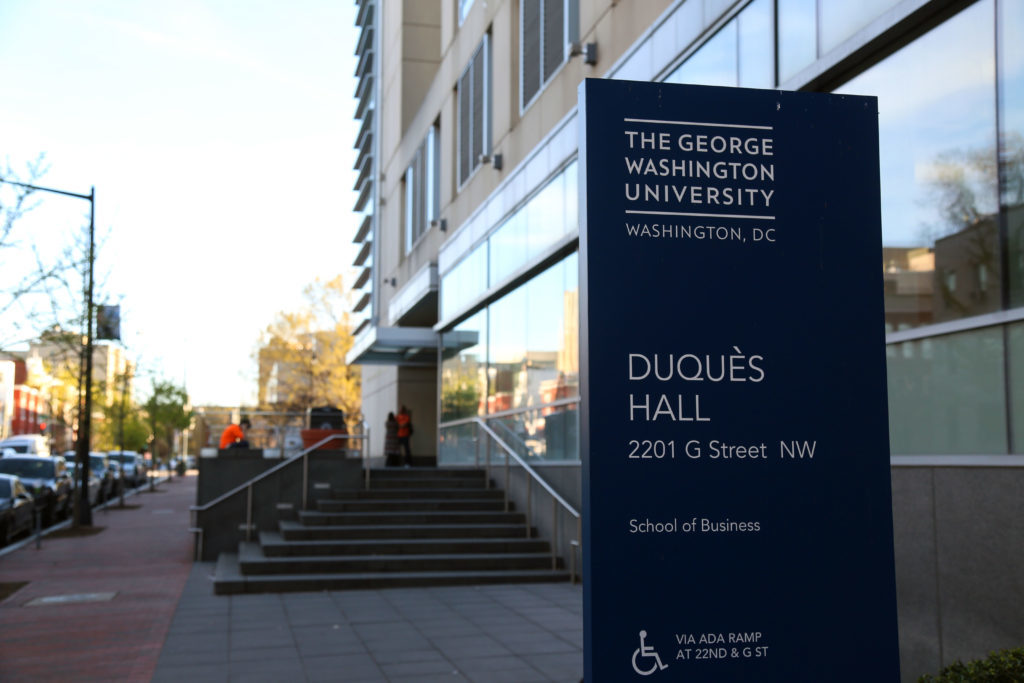Officials in the business school sent out a student survey last month to gauge the level of academic dishonesty within the school.
Officials said the survey, which was distributed March 28, was not created in response to increased violations, but to hear from students about their experiences with cheating and plagiarism to better understand what problems exist and prevent future issues. Faculty in the business school said administrators should learn more about academic dishonesty because changing technologies have led to new cheating methods that are difficult to monitor.
Leo Moersen, the associate dean for undergraduate programs in the business school, said officials are not planning to change University-wide academic integrity policies as a result of the survey, which was sent to both graduate and undergraduate students in the school.
“GWSB does not have a separate policy from the University’s policy. When an incident occurs, we adhere to the University policy closely,” Moersen said in an email. “We’re not expecting any change in policies, but we may evaluate our communication around these issues.”
The survey consisted of five questions that asked students to rank, on a scale of one to five, their perception of academic dishonesty or cheating in the business school overall, on in-class assignments and on assignments outside of class. An optional question asked students to “briefly describe any types of academic dishonesty” that they believe have occurred, without mentioning specific students or class names.
The Office of Academic Integrity’s website includes what students and faculty should review and who they should notify about academic dishonesty, as well as rights and responsibilities for students and faculty. The website outlines how students and faculty should respond to academic integrity violations, either ones that students personally commit – such as cheating on an exam or plagiarism – or those that students and faculty witness others doing.
The website tells students how to prevent academic integrity violations by using free tools to cite sources and stow away technology during exams. When an issue arises, the site advises faculty to check a student’s previous academic integrity record.
Colin Linsley, a teaching professor of accountancy and the chair of the business school’s Teaching Effectiveness Taskforce, said he created the survey because professors often don’t know how big of an issue cheating is beyond what they see in classrooms.
Given the variety of assignments inside and outside of class, professors need students’ input to understand how widespread cheating is and how they can prevent violations, Linsley said. He said many of the school’s professors are “behind the curve” in knowing how students use technology to cheat, like by texting other classmates or looking up information online.
“The concern is that we don’t know how extensive it is, which is why we’re asking the students,” Linsley said. “That’s probably the only way we’ll get a decent sense of just what the perception is. Our guess is the students will have a better perception of it than faculty do.”
Linsley said Linda Livingstone, the dean of the business school, encouraged the survey. Livingstone has identified academic integrity as an issue that the school should be focusing on more.
Linsley said the business school does not have more reports of violations than other schools in the University.
Paul Swiercz, the chair of the business school’s management department, said given the increased use of technology in the classroom, through distance or online learning, instructors are struggling with what constitutes “cheating.” He said cheating in distance learning is particularly hard to monitor because it allows for larger numbers of students in one course who are not physically in the classroom with the instructor.
Swiercz said the immediate access to online information encourages students to use the internet when taking tests electronically. It is much harder to catch students cheating when they’re using technology to take an electronic test, compared to a paper test, he said.
“They can go on their electronic textbooks and find answers to questions in milliseconds,” Swiercz said about online exams.
Although students use electronic devices in classes, Swiercz said he was reluctant to believe that academic dishonesty has increased because academic expectations have not been altered.
To prevent cheating, Swiercz said he implements precautionary measures, like taking attendance before every class and varying exams so that students get different sets of questions.
“Each student effectively gets a different exam,” he said.




